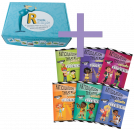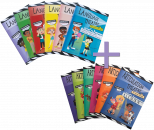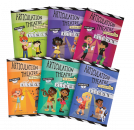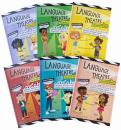SLP Therapy Essentials For Older Students: A Model For Treatment Planning, Intervention, And Family Education #e303
Presenter: Claudia Doan, MS, CCC-SLP
Learn treatment approaches to meet the needs of older students in the areas of articulation, vocabulary and written expression.
"Such a great course! The speaker was informative and I learned so much about older children. Great ideas for speech therapy!"
– L.X., prior course participant
Read more comments about this course!
This course provides a comprehensive overview of the key areas needed to effectively help older students master and generalize their communication goals. Section One highlights several aspects of cognitive and linguistic development in older students to help inform your treatment planning process.
Section Two discusses all aspects of intervention including relationship-building, goal-writing, specific therapy approaches and generalization. Section Three provides specific tools and suggestions for educating and involving families and caregivers so that they can effectively support the older children in their care.
Course is offered for 0.15 ASHA CEUs – 1.5 Contact Hours.
Course Overview – Run Time: 1:33:56
1. Introduction
2. Development
- Early vs. Later Language Development
- Potential Executive Functioning Challenges Through Development
- Language and Cognitive Development in Adolescence
- Mean Length of Utterance in Older Students and Factors To Increase It
- Gradual Improvements in Conversation and Narration Skills as Students Mature
- Comprehension of Linguistic Ambiguity from Jokes in Adolescence
- Developmental Milestones of 10, 15 and 25 year-olds
3. Intervention
- Relationship-Building
- Maslow’s Hierarchy of Needs for School
- Building Trust and Rapport in the Upper Grades
- Writing Goals for Older Students
- Helping Older Students Connect Their Communication Goals to Their Personal Goals
- Using Play-Based Approaches To Build Language in Older Students
- Steps for Teaching
- Self-Advocacy Skills
- Special Therapy Topics
- Metalinguistic Awareness
- Facilitating Generalization
4. Family, Caregiver and Staff Education
- Academic Language Skills Found in Common Core Standards
- Overview of Language Assessment and Intervention
- Speech and Language Skills Frequently Needed in the Workplace
- How Families Can Support Older Children at Home
"Very thorough and meaningful to my daily practice. I liked the self-advocacy and family and caregiver strategies."
– R.L., prior course participant
Read more comments about this course!
"Concrete, practical strategies. Clearly expressed with useful visuals, references to research, and best practices."
– A.K., prior course participant
Read more comments about this course!
The content of this online CE course does not focus exclusively on any specific proprietary product or service. Presenter is the author of, "Articulation Theatre Books" and "Language Theatre Books" published by Northern Speech Services; presenter receives royalties on their sale. Presenter financial and non-financial disclosures may be found in the Presenter & Disclosures area.
Video PowerPoint presentation with author narration & downloadable handout. Stop and re-start the course at any point. Learners retain access to course content after completion for ongoing reference and review.
Reviews
"Going over the play based approach was most helpful. I liked the explanation of everything." S.U. (Apr. 2025)
"It was beneficial to discuss strategies on which best to use with older students." L.H. (Mar. 2025)
"I liked all of the information. Clear and simple slides with relevant information." L.M. (Mar. 2025)
"I found the intervention strategies most beneficial. This course helped me feel better equipped to work with my older students through establishing a more personal relationship in order to achieve more positive results." M.C. (Mar. 2025)
"All the concrete therapy goals to target were helpful. Very practical. Well presented. Provided me with goals I can implement right away." R.D. (Mar. 2025)
"Therapy ideas were helpful. I enjoyed all of the information." C.B. (Feb. 2025)
"The self-advocating was beneficial. I enjoyed the practical content." B.K. (Feb. 2025)
"The consideration of MLU was helpful. Very clear presentation." C.C. (Feb. 2025)
"Discussing how families can support their child at home was beneficial. I liked the areas covering metalinguistic awareness." M.M. (Jan. 2025)
"I found the discussions regarding self-advocacy, executive skills and strategies to develop vocabulary especially helpful. The organization, specific examples given and the handout were excellent. It will be easy to review the handout to provide me with ideas and support on various topics." J.J. (Dec. 2024)
"I liked the idea about modifying therapy to fit in the framework of adolescent life skills. Very easy to understand and relate to real world." A.Y. (Dec. 2024)
"Play-based tx for older students was helpful. Very thorough and meaningful to my daily practice. I liked the self-advocacy and family and caregiver strategies." R.L. (Nov. 2024)
"The information on working with older students was beneficial. I liked the flow of information." C.P. (Oct. 2024)
"Vocabulary ideas, for example using derivations of words, phonetics, morph, semantics, to help comprehension and recall of vocabulary were helpful. Articulation - ideas for words lists, for example listing people in your life with R sound. Clear examples of how to help older students in therapy and generalizing to everyday life." N.J. (Oct. 2024)
"Tying goals to student’s interests and current and future employment goals was a beneficial topic. I liked that the course addressed older students." A.O. (Sep. 2024)
"A wealth of functional and relevant goals and strategies as well as tools were helpful and added to my previous knowledge. Relevant and easily absorbed information that could be put into practice right away." T.H. (Aug. 2024)
"I found the speech-language areas specifically outlined for older students to be the most beneficial for my daily practice. I really like how comprehensive it is in 90 minutes." H.W. (Aug. 2024)
"Family/caregiver support was beneficial. The course was clear and concise." C.P. (Jul. 2024)
"The different ways to generalize and reteach skills learned in earlier years were beneficial. I liked all the information pertaining to "big kids"." A.R. (Jul. 2024)
"Intervention discussion was beneficial and all topics were important. I liked the provided information and strategies that I can use and share with my teachers and parents." G.S. (Jul. 2024)
"Therapeutic intervention and language development were helpful to discuss. I liked the amazing visuals!" A.G. (Jun. 2024)
"The graph which shows how the use of play-based therapy activities can be incorporated into your therapy sessions with older students. I liked the chart that references teaching self-advocacy, The 3 R tip chart, and discussion on steps for understanding the importance of building trust and rapport with your students." T.M. (Jun. 2024)
"Discussion about self-advocacy was helpful. Very organized and accessible instruction on what to prioritize and target with older children." C.H. (Jun. 2024)
"The second window of neuroplasticity, play-based therapy, self-advocacy for older students, and recommendations for the families were all beneficial topics. The course was very clear and practical and highlighted the big takeaways." S.C. (Jun. 2024)
"The goal writing and vocab tied to jobs were helpful. Good practical skills for my older case load." C.S. (Jun. 2024)
"The information was helpful; specifically, topic on tier 2 vocabulary and on roots of words was beneficial." E.P. (Jun. 2024)
"All of the information was beneficial, and I liked the examples." S.B. (May 2024)
"Metalinguistics was a helpful topic. I enjoyed the online format." J.A. (May 2024)
"All the information was beneficial. Mainly real strategies and steps for working with older children. I enjoyed the real-life examples and suggestions." D.V. (May 2024)
"Such a great course! The information was so relevant and interesting! Loved it! The speaker was informative and I learned so much about older children. Great ideas for speech therapy!" L.X. (May 2024)
"Excellent points for working with older clients." N.D. (Apr. 2024)
"The vocabulary instruction was beneficial. I liked the go at your own pace model." J.B. (Mar. 2024)
"I liked discussing self-advocacy. Very useful/relevant information for SLPs working with older students." D.N. (Mar. 2024)
"Self-advocacy, goal setting collaboratively, and supporting their writing were beneficial topics. The presenter was fantastic - super clear and concise and only provided relevant information." K.W. (Mar. 2024)
"Practical recommendations regarding therapy. Good length, specific recommendations for therapy." C.P. (Mar. 2024)
"Beneficial intervention considerations for older students. Practical learning and use of practical examples." S.D. (Feb. 2024)
"Loved the real-world examples and how to connect goals with real-world skills. Liked the pacing and the unique therapy ideas." A.P. (Feb. 2024)
"All of this course was informative." A.K. (Feb. 2024)
"I found discussions helpful particularly on effective therapeutic approaches for older children, with numerous suggestions for activities to engage in to build language through dramatic, constructive and exploratory play. I was also quite interested in what researchers were recommending for vocabulary instruction with older students and activities for optimal development. The use of functional life skills information on how caregivers and families can be supportive of the older child in the home environment was particularly informative." C.F. (Dec. 2023)
"I liked how this course was designed and organized. The speaker was practical in her approach to the topic, defining terms, acknowledging different aspects of an older student's life (where they are at) and how that may influence language therapy effectiveness. I thought the Summary of Key Points at the end was a good reminder for future perusal." C.F. (Dec. 2023)
"The information about MLU and the grammar knowledge of older students will be helpful. Also, learning a new way of looking at writing goals for older students is helpful. I love that this course is geared toward the older students and what they should be able to do and what they really need to focus on learning." A.B. (Dec. 2023)
"I loved the ideas provided! The discussion on the education of staff and parents was helpful." A.S. (Dec. 2023)
"Applicable and functional information. Working with families to encourage generalization was a beneficial topic." M.H. (Dec. 2023)
"I appreciated the play-based approaches that can be used with older students. All of it was very informative. The family education suggestions were helpful." H.R. (Dec. 2023)
"Intervention and tools. I liked all of the examples especially for goal writing." T.J. (Dec. 2023)
"All of the information provided was extremely helpful, especially the intervention part." C.S. (Nov. 2023)
"The play-based therapy adjustment, motivational, self-advocacy, and vocabulary instruction ideas and sequences were helpful topics. I liked the content, rate, and sequence of information presented." J.M. (Oct. 2023)
"Practical and realistic examples of treatment techniques. The visual charts were excellent, specific, detailed, and not overwhelming!" R.F. (Oct. 2023)
"I liked the dramatic play for my ASD students. And the organized graphics with dates of research." L.D. (Oct. 2023)
"Lots of easy-to-implement ideas. I am new to high schoolers and was looking for therapy approaches. I liked all of this course." A.A. (Sep. 2023)
"Course organization and information was very clear. I liked the discussion that you need to make your therapy as functional and personal as it allows." K.H. (Sep. 2023)
"I liked the interventions and the research." K.M. (Sep. 2023)
"Very organized course with lots of practical suggestions. The confirmation of why skills such as sequencing and understanding morphology was helpful." A.S. (Aug. 2023)
"I liked the intervention suggestions and the many examples that were provided. Excellent course." B.P. (Aug. 2023)
"Each of the three areas discussed contained valuable information. I liked the discussion of therapy techniques, of course." M.L. (Jul. 2023)
"Clear and practical information. I liked the review of language development in youth and practical ideas to support students and families." O.Z. (Jul. 2023)
"Lots of helpful information about how older students learn and how to relate to them. I liked the tips on teaching vocabulary and articulation." M.K. (Jul. 2023)
"Concrete, practical strategies. Clearly expressed with useful visuals, references to research, and best practices. I liked the overview of language development in older students, as well as the intervention tips." A.K. (Jul. 2023)
"The carryover activities and ways to educate and support parents and teachers were beneficial. I liked that the therapy intervention was backed by research. Nice course organization." D.H. (Jun. 2023)
"I liked the therapy suggestions to use immediately. And how to help the older student learn skills that are more meaningful in their life." D.G. (Jun. 2023)
"I loved the opportunity to reflect on personal and hands-on goals that can be used with students - fundraising, volunteering, school clubs, etc. This course was organized and broken down easily for understanding and learning!!" W.R. (Jun. 2023)
"This course was functional. I liked the play therapy techniques and self-advocacy strategies." S.S. (Jun. 2023)
"New therapy ideas to use with older students." S.H. (Jun. 2023)
"Building rapport with students, vocabulary development, and how to make it most applicable for older students to generalize the information and skills they learn/practice in speech therapy." A.P. (Jun. 2023)
"I liked the therapy activities, and the advice to give to parents to work on language skills and describe how language skills will affect their child in everyday life. The provided slides were beneficial." J.W. (Jun. 2023)
"These are all interventions that I can easily use. The specific interventions to use with older students were creative." D.B. (May 2023)
"I liked the strategies and tips for therapy. The information regarding the use of tier 2 vocabulary was beneficial." A.K. (May 2023)
Course Objectives
- List important developmental changes that occur during adolescence in the areas of language and cognition.
- Explain how the development of executive functioning, linguistic individualism and metalinguistic awareness can impact speech and language therapy in the upper grades.
- Describe strategies for building trust and rapport with older students.
- Identify ways to help older students connect their speech and language goals to their larger, personal life goals.
- Explain how to teach self-advocacy skills to older students and explain why this is important.
- Summarize treatment approaches that reflect the unique needs of older students in the areas of articulation, vocabulary and written expression.
- List strategies for facilitating generalization in the upper grades.
- Identify specific speech and language skills frequently needed in the workplace.
- Describe how families and caregivers can support their older children at home.
Presenter & Disclosures

Claudia Doan, MS, CCC-SLP, has worked in the field of Speech-Language Pathology since 2008 after receiving Bachelor of Arts and Master of Science Degrees in Communication Disorders from Southern Connecticut State University. She is the author of the blog Creative Speech Lab and has several years of experience working for school systems and in pediatric clinic settings. Claudia is the recipient of the American Speech-Language-Hearing Association's Mentoring Pair Award for original research in the field of Speech-Language Pathology and is a Sertoma International Scholar in Communication Disorders. She is the author of Articulation Theatre Books and Language Theatre Books published by Northern Speech Services.
Speaker Disclosures:
Financial — Claudia Doan is a presenter of online CE courses sponsored by Northern Speech Services; receives royalties.
Financial — Claudia Doan is the author of Articulation Theatre Books and Language Theatre Books published by Northern Speech Services; receives royalties.
Nonfinancial — Claudia Doan has no relevant nonfinancial relationships to disclose.
Intended Audience / Accreditation

This program is offered for 0.15 ASHA CEUs (Intermediate Level; Professional Area).

Intended Audience
- Speech-Language Pathologists
ASHA CEUs:
Northern Speech online courses are registered with ASHA and are offered for ASHA CEUs. The number of ASHA CEUs is noted above. Note that 0.1 ASHA CEU = 1 contact hour = equals 1 CEE.
Earning ASHA CEUs and the ASHA CE Registry:
To earn CEUs from this course and have ASHA CEUs submitted to the ASHA CE Registry, course participants must satisfy each of these requirements:
- Participants must meet the eligibility requirements to earn ASHA CEUs (see below).
- Participants must indicate – prior to course completion – their intent for Northern Speech to submit this course to ASHA.
- Participants must complete/view this course in its entirety.
- Participants must complete the course post test with a minimum of 80% accuracy.
- After successful completion of the post test and completion of the course evaluation, a certificate of course completion is presented to the participant electronically via PDF.
- For those participants who indicated their intent for the ASHA CE Registry, course completion status will be submitted by Northern Speech to ASHA within 45 days of the course completion date.
Eligibility To Earn ASHA CEUs:
Attendees must meet at least one of the following conditions in order to be eligible to earn ASHA CEUs:
- Current ASHA Member.
- ASHA Certificate of Clinical Competence (CCC) Holder.
- Licensed by a state or provincial regulatory agency to practice speech-language pathology (SLP) or audiology.
- Credentialed by a state regulatory agency to practice SLP or audiology.
- Credentialed by a national regulatory agency to practice SLP or audiology.
- Engaged in a Clinical Fellowship under the supervision of an individual with their ASHA CCC.
- Currently enrolled in a master's or doctoral program in SLP or audiology.
If an attendee is not an ASHA member or CCC holder but meets any of the above criteria, they may inform the ASHA CE Registry of their eligibility by visiting this site.
ASHA CE Registry:
During the enrollment process, if you select to receive ASHA credit for this course and if you provide your ASHA number, Northern Speech will automatically submit your CEU information to the ASHA CE Registry after successful course completion (80% on post test). This submission happens once per month, during the first week of the month. For example, if you complete your course on November 7th, Northern Speech will submit all November online course CEUs to ASHA during the first week of December. When ASHA inputs the information into their database, they will mark the course as completed on the last day of the month in which it was completed, so November 30th using this example. The certificate of completion available for you to print immediately, however, will reflect the actual completion date, November 7th in this example. Due to ASHA processing procedures please allow 2-3 weeks, from the submission date, for the course to appear on your ASHA transcript.
Licensing Boards: Most state licensing boards DO accept CEUs earned online (usually classified as home-study credits). Some state boards do, however, place a limit to the number of credits that can be earned via home study/online courses. For the most current information, we suggest that you contact your licensing board or agency to verify acceptance policies and/or any credit limits related to home-study courses prior to registering for this course.
Additional accrediting agencies by which Northern Speech is an approved CE provider:
- California: NSS is approved as a provider of continuing education by the California Speech-Language Pathology & Audiology Board. Provider #PDP4. Online CEU limits may apply; please contact SLPAHADB for current online CEU acceptance policies.
- Iowa: NSS is approved as a provider of continuing education by the Iowa Board of Speech Pathology and Audiology Examiners. Provider #169.
- Kansas: NSS is approved as a provider of continuing education by the Kansas Department of Health and Environment. Provider #LTS-S0005.
- Florida: NSS is approved as a provider of continuing education by the Florida Speech-Language Pathology and Audiology Board. Provider #SPA-026.
- New Jersey: NSS is approved as a provider of continuing education by the New Jersey Department of Education. Provider #1654.
Frequently Asked Questions
Customer Support: Please phone 888.337.3866 or email info@northernspeech.com.
Course Completion Timeframe:
You have unlimited time to complete our online courses. You may log off and log on as often as you’d like to in order to complete all sections of a course.
However, completion dates are based on Eastern Standard Time. Therefore, if you need your CEUs by a certain date, be sure to complete the course test before 11:59pm EST on that date. For example, if you need CEUs before January 1st, you will need to complete the course test before 11:59pm EST on December 31st.
Content Access:
Access to course materials and content does not expire, even after completing the post test. You may continue to review course material by logging into your NSS account, clicking the My Online Courses tab, and then viewing your desired course.
Certificate of Completion:
On successful completion of the post test (80%), a certificate will be immediately available for download and/or printing. This certificate will include your name, date of completion (based on Eastern Time Zone, USA/Canada), and number of contact hours (CEUs / CEEs). Please note that CEUs are awarded on the date of successful test completion, not the date of course enrollment. Please ensure that you successfully complete the post test prior to any licensure renewal dates.
ASHA CE Registry Submission:
During the enrollment process, if you select to receive ASHA credit for this course and if you provide your ASHA number, NSS will automatically submit your CEU information to the ASHA CE Registry after successful course completion (80% on post test). This submission happens once per month, during the first week of the month. For example, if you complete your course on November 7th, NSS will submit all November online course CEUs to ASHA during the first week of December. When ASHA inputs the information into their database, they will mark the course as completed on the last day of the month in which it was completed, so November 30th using this example. The certificate of completion available for you to print immediately, however, will reflect the actual completion date, November 7th in this example. Due to ASHA processing procedures please allow 2-3 weeks, from the submission date, for the course to appear on your ASHA transcript.
Purchase Orders:
Purchase orders are currently not accepted for online orders, if you wish to submit a purchase order please do so at info@northernspeech.com or fax to 888-696-9655.
What is an Online Course?
Our Online Courses consist of video, audio, and/or text content and are offered for ASHA CEUs. Unlike a webinar, which requires participants to be logged on and at a computer at specific times, our Online Courses are available to you at any time, from any device, via your NorthernSpeech.com online account. You may work at your own pace and start and stop your course as you wish. Your course will conclude with a short post test. On successful completion of the post test (>80%), a printable certificate of completion is presented to you.
Receiving CEUs:
Northern Speech is an ASHA CE Provider and our online courses are registered with ASHA and offered for ASHA CEUs. Please note that successful completion of the online post test is required prior to the awarding of CEUs. Please contact your state licensing board for acceptance policies related to CEUs earned online. Please note that courses offered for university students are not applicable for CEUs.
Registering for an online course:
You may browse all online courses by clicking the Continuing Education tab above, then Online Courses. Once you find a course, click Enroll Now, and you will be asked to either log into your existing Northern Speech account or create a new online account. Once you’ve entered your account information and provided your credit card payment, your course will be immediately available to you.
Accessing your purchased course or returning to a purchased course:
You will be able to access your online course by logging into your Northern Speech account and then clicking the My Online Courses tab on your profile screen. Click the course you would like to start or to resume. From there, proceed through the course sections until you are ready to complete the post test. You do not have to complete your course all at once. You may log on and off as you wish.
Testing requirements:
Each online course concludes with a post test consisting of multiple choice or true & false questions. Scores of 80% or greater are required for successful course completion and awarding of CEUs. You may revisit course materials and retest as needed to achieve a passing score.
Number of CEUs offered:
We offer courses from 1 to 21 contact hours. Each course will note the number of CEUs offered. Please note that 0.1 CEU = 1 contact hour = 1 CEE.
State licensing boards and online CEUs:
NSS is an ASHA CE Provider and most state licensing boards DO accept ASHA CEUs earned online (usually classified as home-study credits). Some boards do, however, place a limit to the number of CEUs that can be earned via home study/online courses. For the most current information, we suggest that you contact your licensing board or agency to verify acceptance policies and/or any CEU limits related to home-study courses prior to enrolling in an online course.
Course formats:
Our course formats include: text, audio, video, and PowerPoint with author narration. Each course will note the format on the course description page. Most courses include closed captioning.
Course handouts:
Most of our online courses provide a link to download the accompanying handout as a PDF file.
Group discounts:
Groups of 3 or more are eligible for a 20% discount on each registration on most of our online courses. To receive this discount, registrations need to be processed together via the "Group Rates" tab on the Online Course of your choice.
Computer requirements:
For our online courses to function best, we recommend that you update your computer to include the newest version of your Internet browser (Safari, Chrome, Firefox, Edge, Internet Explorer, etc.) and newest version of your computer's operating system. Also a high-speed Internet connection is recommended (cable or DSL). Speakers or headphones will be required for many of our courses as many contain audio components.
Course Cancellation Policy:
A purchased online course can be exchanged, refunded, or transferred to another individual if contact is made with NSS (via phone or email) within 30 days of purchase and the course materials have not been viewed or downloaded.
Special Needs:
Please click here for any special needs requests, and we will do our best to accommodate them.
| Contact Us |






